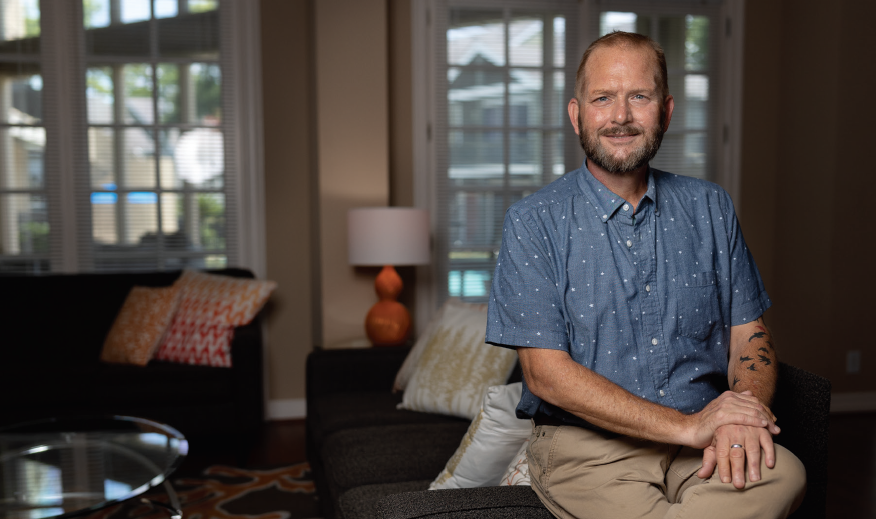Finally Getting a Good Night’s Sleep
A native of Sherman, Texas, a small town north of Dallas, Jamey Williams remembers having a hard time breathing as a child when his family vacationed at higher elevations. He also had difficulty breathing while completing his undergraduate and graduate work at Texas Tech University in Lubbock, a city with an elevation of 3,200 feet. “Right as I fell asleep, I would jerk awake because I had stopped breathing,” he says.

After living in Austin for many years, he and his partner moved to northern California in 2014. Two years later, when he was 44, he noticed that poor quality of sleep was lowering his energy level during the day and affecting his personal and professional life. He made an appointment with a sleep medicine specialist who diagnosed central sleep apnea (CSA), a serious breathing disorder that occurs when the brain fails to send the signals needed to breathe during sleep.
CSA may be caused by health conditions or medications that affect how the brain controls the airway and chest muscles, and the condition has been shown to negatively impact quality of life and heart health.
“I was told that anyone with more than five events an hour should be treated, and I was having about 90 events per hour during the sleep study,” Williams says. “I had lived with CSA for a long time without knowing that I could have a stroke or heart attack.”
In light of the potential for brain and heart damage, his sleep medicine specialist started him on a BiPAP machine in ST mode, in which breathing is triggered by both the patient and the machine. If the patient doesn’t initiate a breath within a set time limit, the machine does it automatically.
In 2019, Williams and his partner moved to Houston, and he started looking for a sleep medicine specialist immediately. He found Aparajitha Verma, MD, MBA, a neurologist in the Vivian L. Smith Department of Neurosurgery at McGovern Medical School at UTHealth Houston and medical director of patient experience and quality at UTHealth Houston Neurosciences. Verma repeated the sleep study to confirm his diagnosis. The results showed severe predominantly central sleep apnea.
“Jamey was having a hard time tolerating the mask and the machine, so when we discussed his sleep study results, I recommended that he try the remedē® System,” she says.
During his time in northern California, Williams had researched remedē, an innovative implantable device that safely and effectively treats moderate to severe CSA in adult patients. A cardiologist implants the device, along with a battery pack, under the skin in the upper chest area and inserts thin wires into the blood vessels in the chest near the phrenic nerve. The device monitors respiratory signals during sleep and sends signals to the diaphragm to stimulate breathing when needed. Verma referred Williams to Paul Schurmann, MD, an assistant professor of cardiology at Baylor College of Medicine, who sees patients in the Texas Medical Center.
“After reviewing my medical records from California and the sleep study results from Dr. Verma, Dr. Schurmann said I was an ideal candidate for the procedure,” Williams says. “I had chronic fatigue, excessive daytime sleepiness, brain fog, and cognitive impairment, and was unable to fall asleep or get the restful sleep I needed.”
The system is implanted in a surgery that typically lasts three to four hours, and patients are discharged the same day.
After implantation, Verma allowed six weeks of healing time before working with Williams to adjust the settings to ensure that he was breathing normally. “Jamey had no relief from central sleep apnea for a long time,” she says. “He needed work with structured hours so that he could allocate adequate hours to sleep.”
Today, he teaches fine arts to students in grades 7-12. “The device is so much a part of me now that I forget it’s there. I’m a member of a Facebook group for people with CSA and always tell those who are anxious about it to do a meditation and try to fall asleep before it comes on,” he says. “I don’t feel the stimulation any longer.”
Williams still has more than five events per hour, but says he’s doing great. “I’m 49, and I have a lot of energy. I do think I’ve suffered some cognitive deficits. I’m very forgetful about things, and this has been going on for several years. People with breathing issues should look for help. Dr. Verma is a caring professional and will nudge you if you don’t do what you’re supposed to do. I never miss an appointment and wouldn’t trade her for anything. It’s 5:03 p.m. and I’m about to cook dinner. Before remedē, I would need a nap about now.”











